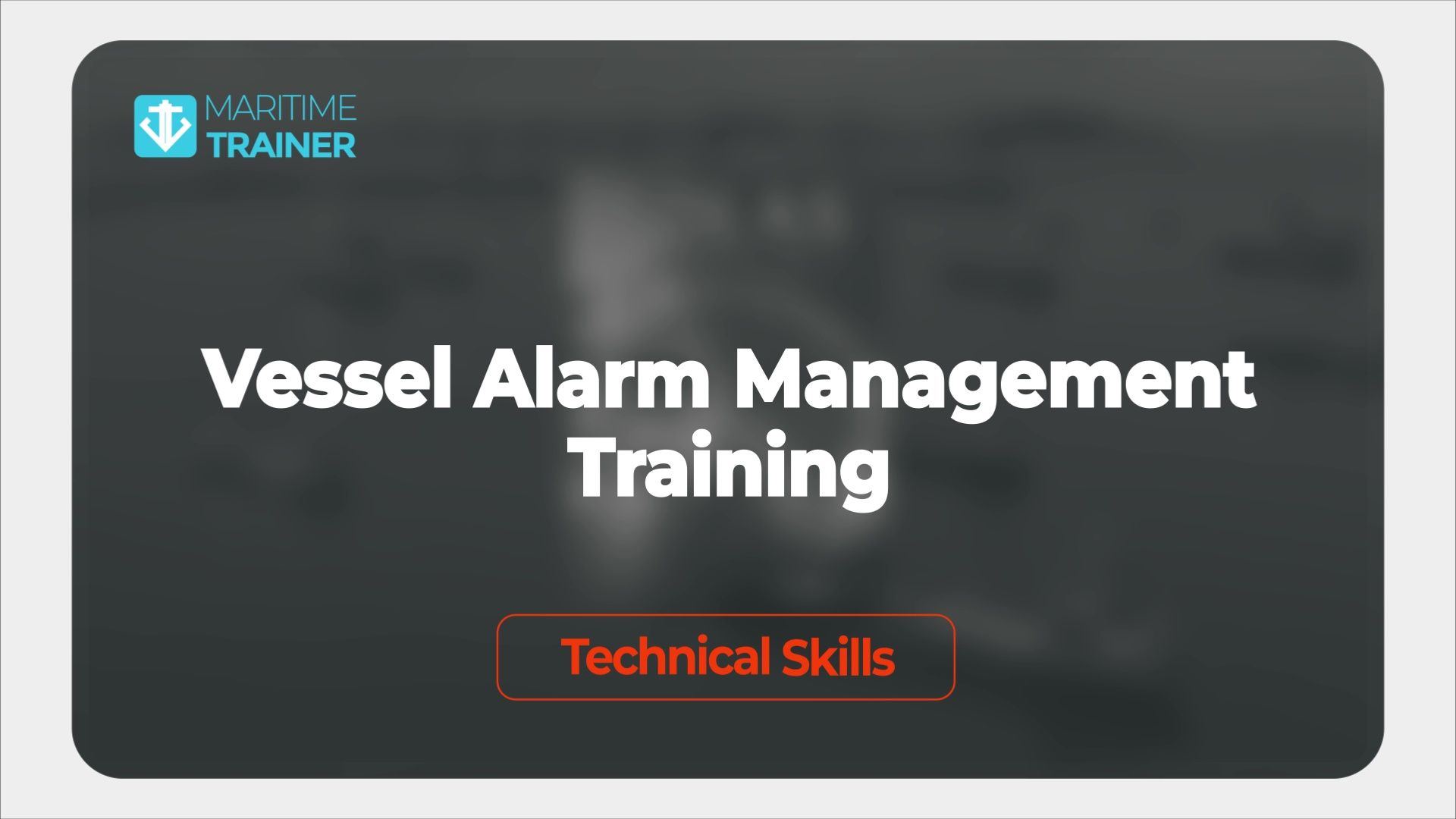Mastering Vessel Alarm Management: Essential Training for Maritime Safety
In the maritime industry, effective alarm management is crucial for maintaining the safety and efficiency of ship operations. Alarms and alerts on vessels are vital in indicating potential hazards and operational issues that require immediate attention. Proper understanding and management of these alarms can significantly enhance the overall safety of maritime operations. This comprehensive guide aims to provide an in-depth understanding of vessel alarm management, covering various alarm types, applicable regulations, best practices, and the importance of training for maritime personnel.
The Importance of Alarm Management in Maritime Operations
Alarm systems on ships are designed to alert the crew to various conditions that require immediate action. These conditions can range from equipment malfunctions and fire hazards to navigation issues and environmental parameters. Effective alarm management ensures that these alarms are appropriately prioritized, understood, and acted upon, thereby preventing accidents and ensuring the safety of both the crew and the vessel.
Types of Alarms on Ships
- Fire Alarms: These alarms indicate the presence of smoke or fire on the vessel. They are critical for early detection and prompt response to fire incidents.
- Engine Alarms: Engine alarms alert the crew to issues related to the ship's propulsion and auxiliary machinery. These alarms can indicate problems such as high temperature, low oil pressure, and abnormal vibrations.
- Navigation Alarms: These alarms are related to the ship's navigational equipment and systems. They alert the crew to potential navigational hazards, such as proximity to other vessels or shallow waters.
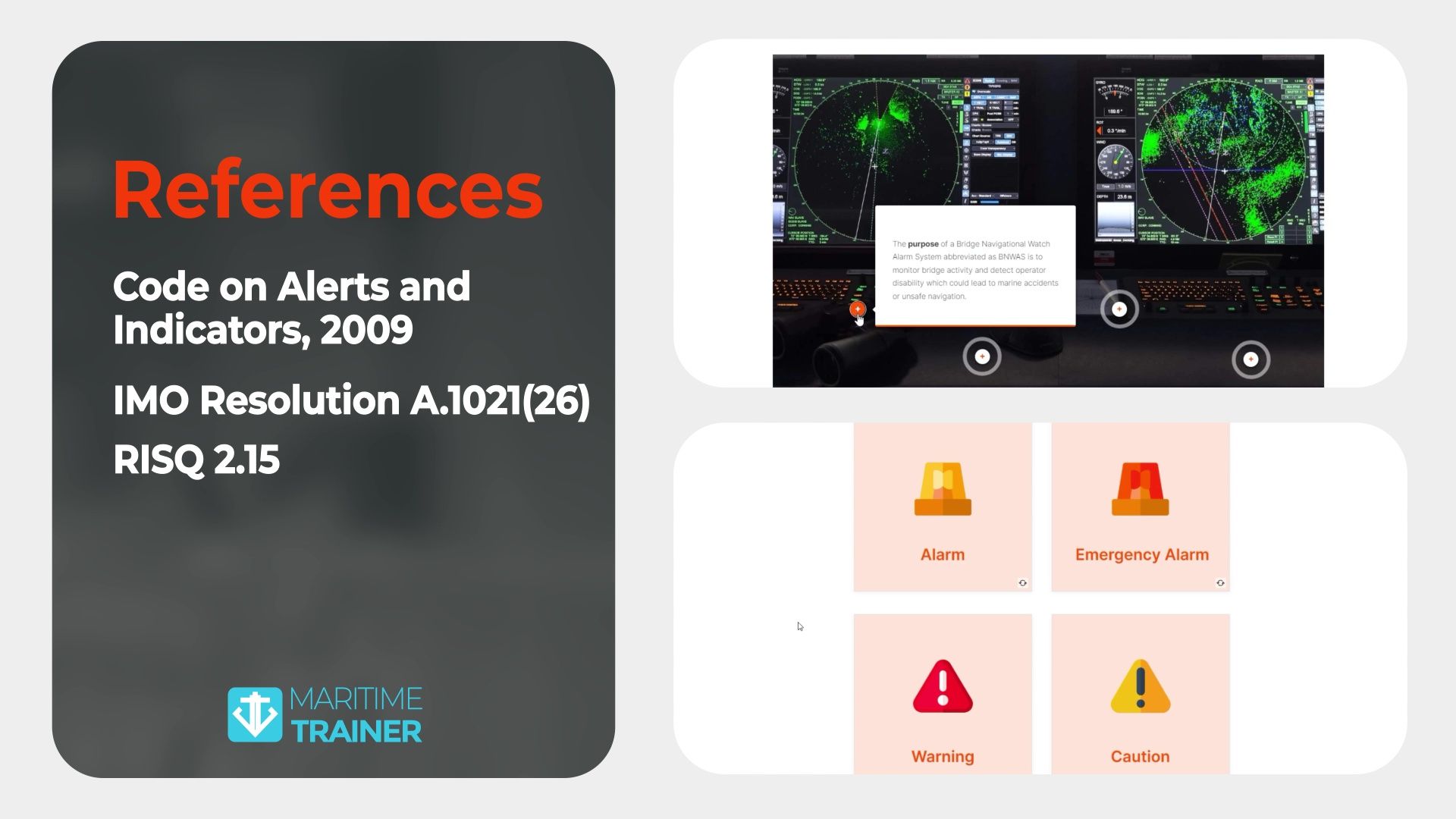
- Bilge Alarms: Bilge alarms indicate the presence of water in the bilge spaces of the ship. This can be a sign of hull leakage or flooding, requiring immediate attention.
- Gas Detection Alarms: These alarms detect the presence of hazardous gases, such as carbon monoxide or flammable gases, which can pose serious risks to the crew's safety.
- High-Level Alarms: These alarms indicate that a tank or compartment has reached a critical fill level, which can be crucial for maintaining stability and preventing spills.
- Low-Level Alarms: Conversely, low-level alarms indicate that a tank or compartment's content has dropped below a safe threshold, potentially impacting operations or safety.
Regulatory Framework for Alarm Systems
The International Maritime Organization (IMO) provides comprehensive regulations for alarm systems on ships to ensure safety and compliance. The primary regulatory framework is outlined in the International Convention for the Safety of Life at Sea (SOLAS) and various IMO resolutions.
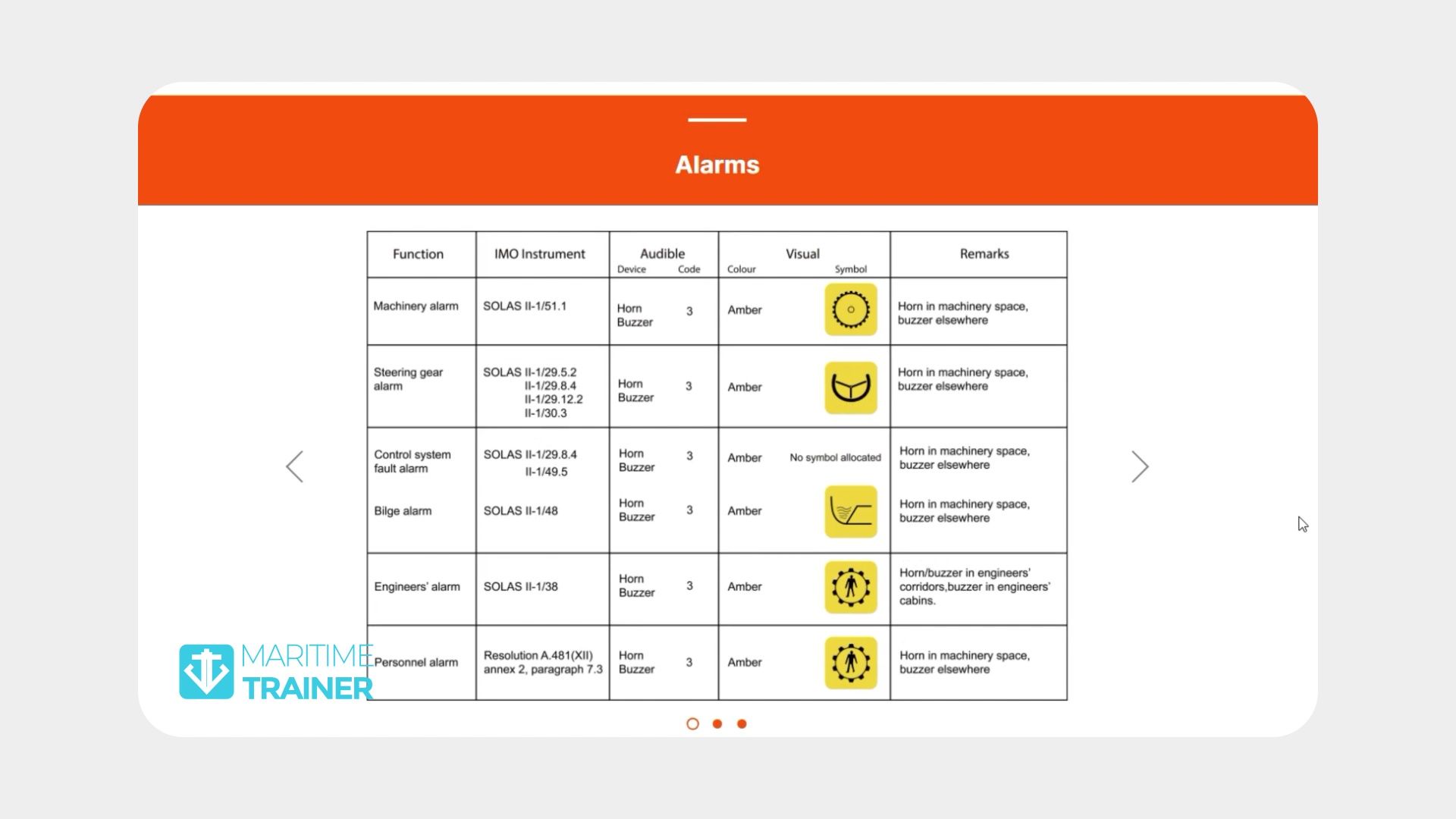
SOLAS Regulations
SOLAS Chapter II-1, Part C, Regulation 31, outlines the requirements for machinery alarms and indicators. It mandates that all essential machinery and systems must be fitted with alarms to alert the crew to abnormal conditions. The regulation emphasizes the need for audible and visual alarms to ensure that alerts are noticed promptly.
IMO Resolution A.1021(26)
IMO Resolution A.1021(26) provides guidelines for the design and operation of alarm systems on ships. It covers aspects such as the prioritization of alarms, the presentation of alarm information, and the need for redundancy in alarm systems. The resolution also emphasizes the importance of training and familiarization for the crew to ensure effective alarm management.
Best Practices for Alarm Management
Effective alarm management requires adherence to best practices that ensure alarms are appropriately handled and responded to. Here are some key practices:
- Alarm Prioritization: Not all alarms have the same level of urgency. It is crucial to prioritize alarms based on their potential impact on safety and operations. High-priority alarms, such as fire or engine failure, should be addressed immediately, while lower-priority alarms can be monitored and managed accordingly.
- Clear Alarm Presentation: Alarms should be presented in a clear and unambiguous manner. The use of standardized symbols, colors, and sounds can help the crew quickly understand the nature and urgency of the alarm.
- Regular Maintenance and Testing: Alarm systems should be regularly maintained and tested to ensure their reliability. This includes checking sensors, updating software, and verifying that all alarms are functioning correctly.
- Training and Familiarization: Crew members should receive regular training on alarm systems and procedures. This training should cover the operation of alarm systems, the significance of different alarms, and the appropriate responses to various alarm conditions.
- Documentation and Record-Keeping: Proper documentation of alarm events and responses is essential for ongoing monitoring and improvement. Maintaining detailed records helps in identifying patterns, diagnosing recurring issues, and implementing preventive measures.
- Redundancy and Backup Systems: To ensure reliability, alarm systems should have redundancy and backup mechanisms. This can include duplicate sensors, alternative power sources, and fail-safe modes to ensure continuous operation even in the event of a system failure.
- Integration with Other Systems: Alarm systems should be integrated with other onboard systems, such as the ship's management system and communication networks. This integration enables a coordinated response to alarms and enhances overall situational awareness.
The Role of Training in Alarm Management
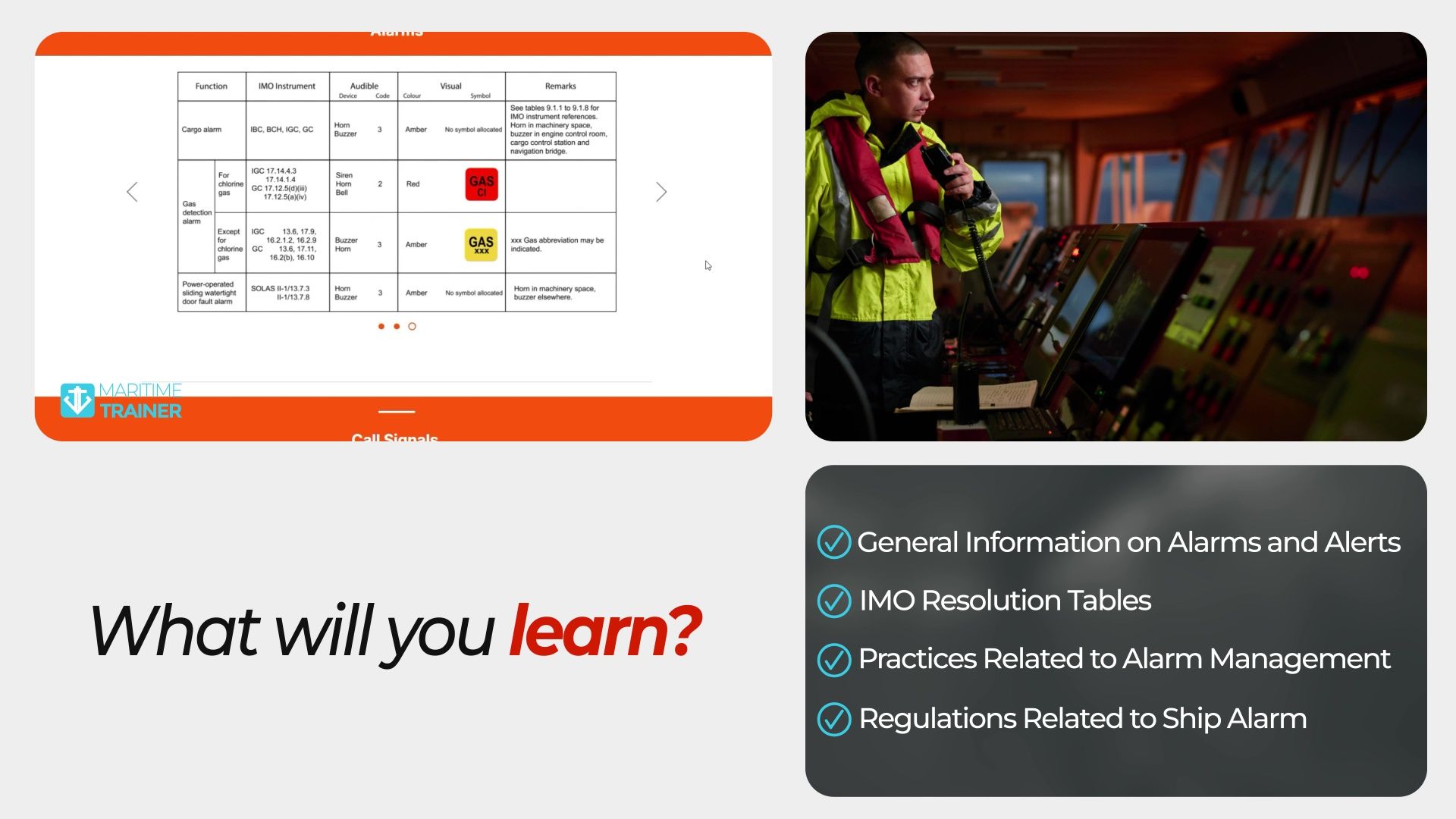
Training plays a pivotal role in ensuring effective alarm management. Maritime personnel must be well-versed in the operation and significance of alarm systems to respond promptly and appropriately to alerts. Here are some key aspects of training for alarm management:
- Initial Training: New crew members should receive comprehensive training on the ship's alarm systems during their onboarding process. This training should include hands-on experience with the systems and an understanding of the specific alarms they may encounter.
- Ongoing Training: Regular refresher courses and drills are essential to keep crew members updated on any changes to the alarm systems and to reinforce their response procedures. Ongoing training helps maintain a high level of readiness and competence.
- Scenario-Based Drills: Conducting scenario-based drills allows crew members to practice their responses to various alarm conditions in a controlled environment. These drills help identify any gaps in knowledge or procedures and provide an opportunity for improvement.
- Assessment and Certification: Assessing the crew's understanding and competence in alarm management through regular evaluations ensures that they meet the required standards. Certification programs can validate their proficiency and readiness.
Vessel Alarm Management Training Course
To address the need for effective alarm management training, Maritime Trainer offers a comprehensive Vessel Alarm Management Training course. This course is designed to provide maritime personnel with the knowledge and skills required to manage shipboard alarms effectively, ensuring safety and compliance with international regulations.
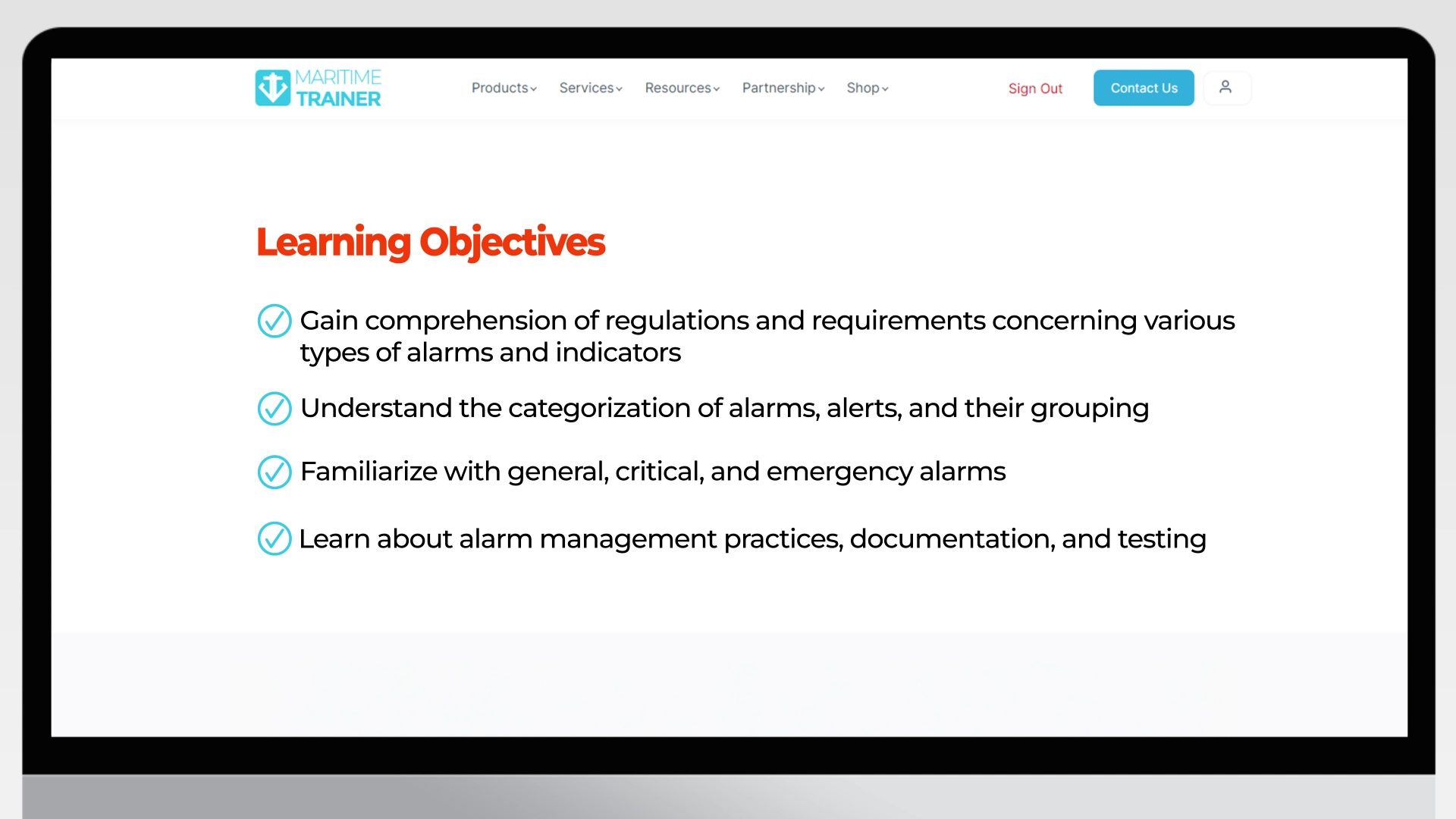
Course Overview
Our Vessel Alarm Management Training course covers the following topics:
- Introduction to Alarm Management: Overview of the importance and objectives of alarm management on ships.
- General Information on Alarms and Alerts: Understanding different types of alarms and their functions.
- IMO Resolution Tables: Detailed explanation of the regulations and guidelines provided by the IMO.
- Best Practices for Alarm Management: Practical strategies for prioritizing, presenting, and responding to alarms.
- Regulations Related to Ship Alarm Systems: In-depth discussion of SOLAS regulations and IMO resolutions.
- Conclusion: Summary of key points and best practices for maintaining an effective alarm management system.
Course Details
- Duration: 45 minutes
- Language: English
- Skill Level: Operational
- Assessment: Yes
- Certificate & Validity: Yes, valid for 5 years
Who Should Enroll
- Deck and Engine Personnel (Management, Operational, Support)
- Electric Operational Personnel
- Applicable to various ship types, including Oil Tankers, LNG Tankers, General Cargo, and more.
Why Choose Our Course
Our Vessel Alarm Management Training course is developed by leading experts in the maritime industry. It offers interactive learning accessible immediately via email link and provides certification upon course completion, valid for five years. This course ensures that maritime personnel are equipped with the necessary knowledge and skills to manage shipboard alarms effectively, enhancing safety and operational efficiency.
Conclusion
Effective alarm management is critical for ensuring the safety and efficiency of ship operations. Understanding the various types of alarms, adhering to regulatory requirements, and following best practices are essential components of a robust alarm management strategy. Training and familiarization of crew members play a significant role in achieving this objective.
Start your online learning journey today.

Approved & Certified by Bureau Veritas

We are proud to be member of



